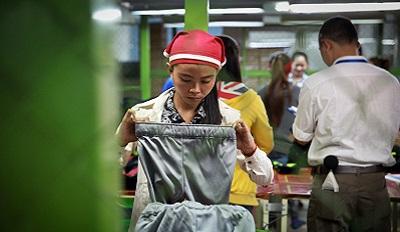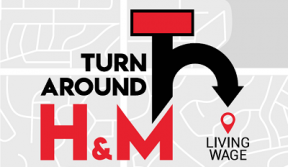
This month, the Cambodian National Institute of Statistics will carry out a survey of 1,500 garment workers in Phnom Penh in preparation for upcoming national minimum wage negotiations. The negotiations are conducted within a committee of 28, comprised of 14 government, seven business and seven union representatives. This October, they will sit down and determine the base salary for Cambodia’s 800,000 garment workers that is scheduled to go into effect in January 2018. In Cambodia, the $6 billion per year garment industry is the only sector that has a set national minimum wage. Because the industry makes up 80% of Cambodia’s Gross Domestic Product, where apparel wages go, so the country goes. Now, a proposed law to guide the process is poised to sew up the last few gaps that allow independent unions to push the minimum wage closer to a living wage.
To understand how things got this way, you have to go back a few years. In 2014, the police crushed a wage protest in Phnom Penh by shooting into crowds of striking workers, killing five. The minimum wage has been a national rallying point for the industry for years; Cambodia has one of the lowest wages in the world, from which multinational clothing companies have profited. The minimum wage for garment workers now sits at $153. Since 2014, workers have demanded $171, and calculations place the actual living wage anywhere from $207 to $397. The violent repression caused international criticism of the government’s actions, and demonstrated that organized labor could be serious force in Cambodia.
The following year, a law was passed that required all non-governmental organizations (NGOs) to register with the government – with the caveat that the government could approve or deny these registrations at their discretion, with no formal process or transparency. In November 2015, the Cambodian parliament approved a similar law on trade unions, imposing even stricter registration requirements and making it nearly impossible for new unions to register. A union needs to hold “majority status” in a factory before representing any worker; for a factory with 7,000 workers, that’s 3,500 signatures before helping a single person or even calling a meeting. Now, when workers who are in the process of organizing are fired, there’s often not a majority-status union to help them contest the retaliation, leading organizing efforts to grind to a halt. Almost immediately after the law’s passing, registrations of independent unions fell to zero.
Now, the focus is on a new minimum wage law that would govern an annual process of determining a wage, and acceptable behavior in the intervening months. The law criminalizes protest, public dissent, and even independent research in relation to the minimum wage. The only allowed discussion of the wage happens in a committee of 28 people, who determine the minimum wage for hundreds of thousands of workers. After that figure is announced, anyone who voices a different opinion, protests the decision or even researches different wage figures could be fined or even imprisoned. This law, just like the trade union and NGO laws, is being presented as a peaceful, measured way to prevent further violence – when, in fact, it’s intended to protect the government from pressure to raise wages again.
All of this is complicated by the fact that Cambodia is facing what could be a pivotal general election in July 2018, and a struggle for the votes of garment workers. In the last local elections, amid the largest voter turnout in the country’s history, the ruling Cambodian People’s Party (CPP) took home just 51% of the vote. That figure stands in stark contrast to their 97% sweep the year before. Either the CPP, or its main challenger, the CNRP, will need the support of unions if they hope to control the country next year, and the wage level is a key issue for most members.
And where are the brands in all of this? The American Apparel & Footwear Association has spoken out against the minimum wage law, and major producers in Cambodia such as H&M and adidas have voiced their support for improvements in Cambodia’s garment sector. But as of yet, these promises haven’t been followed up with an increase in the amount brands are willing to pay per piece of clothing. In fact, the purchasing practices of major brands and their participation in the “race to the bottom” are what caused the depression of wages in the first place. Unless brands cough up the funds to pay their suppliers more, it’s tough to see where the money for improvements would come from.
Since the draft law mandates the wage be a “predictable figure or increment rate that grows gradually,” it’s hard to imagine how Cambodia could reach a living wage if this law passes, other than through a miracle of sheer government benevolence. Each year the stranglehold on democracy in this small country gets a little bit tighter with the passage of anti-union laws, and soon independent unions may be completely paralyzed by complex bureaucratic systems and never-ending fines. If there’s hope for Cambodians to have fair elections and exercise their democratic rights, it’s crucial to oppose and stop the laws that restrict freedom of association, the registration of independent democratic unions, and advocacy for fair and living wages.

